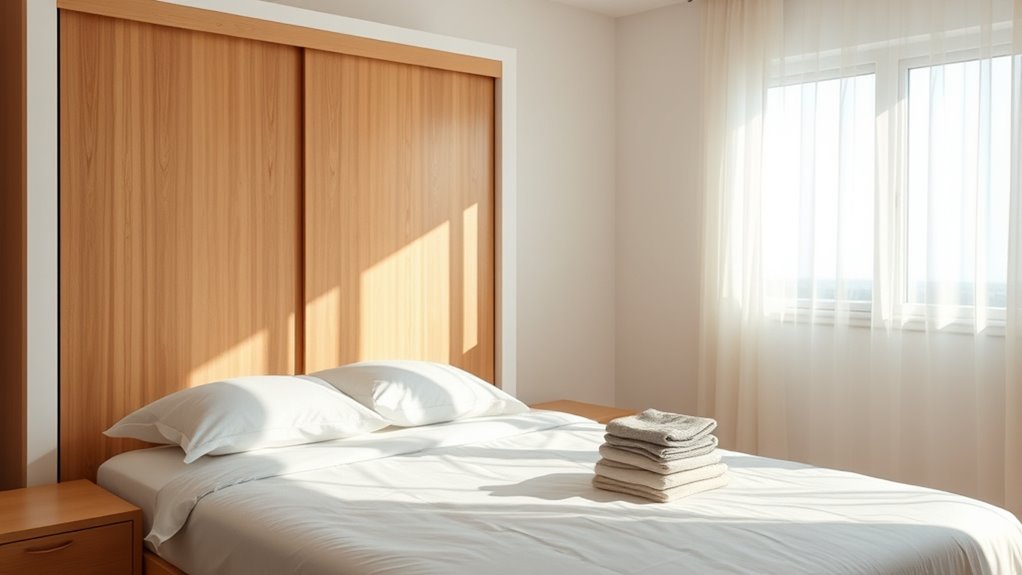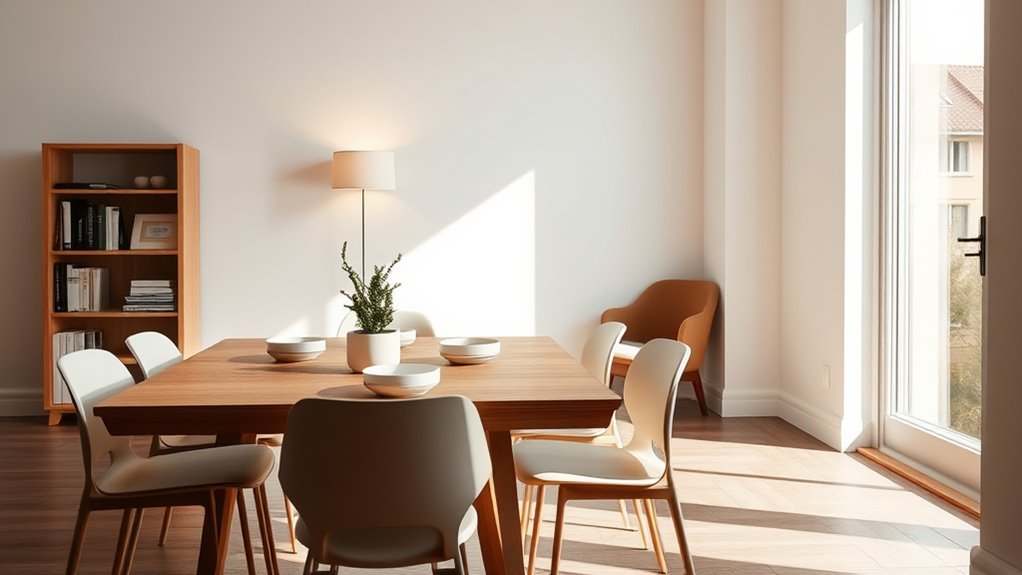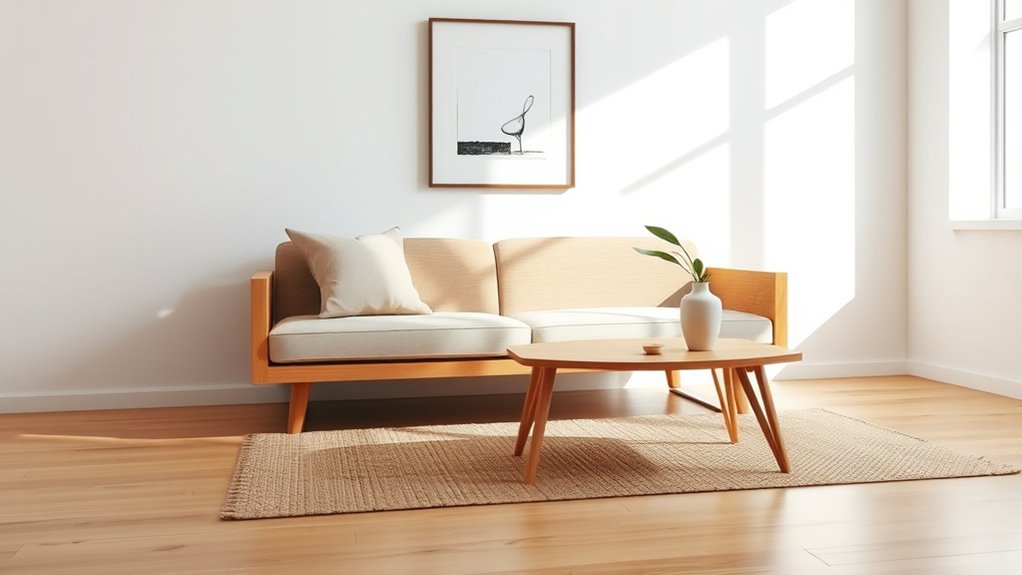By owning less, you’ll cut your monthly expenses considerably, from lowering utility bills by downsizing to avoiding unnecessary purchases. Simplifying your life frees up savings, helping you pay off debt faster and build wealth. Plus, fewer possessions mean less clutter and storage fees, boosting your mental clarity and reducing stress. Embracing minimalism benefits the environment and community too. If you want practical ways to make your financial and personal life lighter, keep exploring how minimalism transforms your future.
Key Takeaways
- Owning fewer items reduces expenses on storage, maintenance, and replacements, leading to significant long-term savings.
- Minimalist living lowers utility bills and housing costs by downsizing, decreasing energy and property expenses.
- Less clutter minimizes impulse spending and simplifies budgeting, helping to increase savings and financial control.
- Reduced consumption decreases waste and environmental impact, often translating into lower utility and transportation costs.
- Prioritizing quality over quantity decreases frequent purchases, saving money and promoting sustainable, cost-effective habits.
Reducing Monthly Expenses Through Simplification

Reducing monthly expenses through simplification begins with evaluating your current spending and identifying areas where you can cut costs. For example, many Americans spend around $318 a month on household furnishings and upkeep. By decluttering, avoiding unnecessary purchases, and doing DIY maintenance, you can cut these costs by 25% or more each year. Energy use is another big factor—heating, cooling, and running appliances can be managed by adjusting thermostats seasonally, lowering water heater settings, and running appliances only when full. Switching to energy-efficient LED bulbs and appliances further reduces utility bills and benefits the environment. Prioritizing sustainability not only saves money but also minimizes waste, helping you live more intentionally while keeping expenses in check. Additionally, understanding how market conditions and investment options like Gold IRA can be part of a broader financial plan can enhance your overall financial health. Incorporating energy-saving habits into your daily routine can significantly amplify your savings efforts over time.
Downsizing Your Living Space for Financial Benefits

Downsizing your living space can considerably boost your financial stability by lowering your housing costs. Smaller homes typically mean lower monthly mortgage payments, especially if you buy a less expensive property or sell a larger one for equity. You might even pay off your mortgage entirely or switch to shorter-term loans, reducing interest payments. Property taxes decrease as home values and square footage shrink, often cutting bills in half or more. Utility costs drop because smaller spaces require less energy for heating, cooling, and lighting, while maintenance becomes easier and cheaper. Moving to a walkable or transit-accessible neighborhood can eliminate the need for a second vehicle, saving you on insurance, fuel, and repairs. Additionally, exploring tiny house options can further reduce your housing expenses and provide flexible living arrangements. Overall, downsizing frees up money, enhances financial flexibility, and helps you meet long-term goals. Assessing needs and planning ensures your new space aligns with your financial and lifestyle goals.
Cutting Costs on Clothing and Consumer Goods

By adopting a minimalist approach, you can considerably cut your spending on clothing and consumer goods. Instead of frequent impulse buys, focus on purchasing fewer, higher-quality items. This strategy saves money long-term by reducing replacements and maintenance costs. You’ll also avoid clutter, lowering expenses for storage and upkeep. To illustrate, here’s a quick comparison:
| Spending Type | Cost Savings |
|---|---|
| Clothing (average $1,700/year) | Fewer purchases, higher quality |
| Non-essential household items | Reduced clutter, fewer replacements |
Additionally, maintaining a curated wardrobe aligned with color accuracy principles can help ensure your clothing choices remain versatile and visually appealing over time. Developing an understanding of financial management can further support sustainable spending habits and long-term savings. Practicing mindful shopping habits can also prevent unnecessary purchases and promote financial discipline.
Minimizing Dining Out and Entertainment Spending

Minimizing your dining out and entertainment expenses can substantially boost your budget and help you live more intentionally. Dining out costs nearly 285% more than cooking at home, with the average inexpensive meal at $16.28 compared to $4.23 for a home-cooked one. By cooking at home, you could save around $12 per meal and over $13,000 annually. Americans spend about $166 monthly on dining out, often for lunch or dinner, with moderate spending being more common. Cutting back can reduce your food expenses, especially as recent inflation has increased away-from-home food costs by over 20%. Replacing restaurant outings with home-based socializing or affordable activities redirects funds toward meaningful experiences, helping you stick to your minimalist goals while saving money. Recent trends show that consumer dining habits are shifting toward more takeout and home-cooked meals, making it easier to control expenses. Additionally, adopting a minimalist lifestyle encourages reducing unnecessary expenditures, including dining out. Being mindful of your spending habits and choosing quality over quantity can further enhance your financial savings and overall well-being. Incorporating mindfulness practices into your routine can also help you become more aware of your spending patterns and resist impulse purchases.
Eliminating Storage Fees and Clutter-Related Costs

Eliminating storage fees and clutter-related costs can considerably improve your financial health and simplify your life. Renting storage units costs between $50 and $75 for small spaces, while medium and large units can cost $140 to over $500 monthly. In high-demand cities like Honolulu or Santa Barbara, fees can reach over $300 per month, adding up to thousands annually. Avoiding these expenses frees up cash for savings or investments. Beyond storage costs, clutter leads to indirect expenses, such as increased cleaning, maintenance, and time lost searching for items. Downsizing possessions reduces or eliminates the need for external storage, cutting costs and freeing your space. Simplifying your belongings also lowers risks of damage, loss, or higher insurance premiums, making your home more efficient and financially sound. Storage unit prices vary based on size, location, and features, so choosing smaller or less feature-rich units can further reduce costs. Additionally, choosing tuning upgrades that improve vehicle efficiency can help save money on fuel and maintenance over time, aligning with a minimalist lifestyle focused on cost reduction. Incorporating smart organization techniques can further optimize your space and reduce clutter, which also minimizes emotional stress associated with disorganization and enhances overall well-being, amplifying these savings.
Lowering Debt and Boosting Savings With Less Spending

By focusing on essential expenses and cutting non-essentials, you can reduce your spending and prevent new debt. Redirecting those savings toward paying off existing debts accelerates your progress and boosts your financial security. When you live within your means, you free up funds to build your savings and achieve greater financial freedom. Understanding debt consolidation and its benefits can further streamline your repayment process and help you stay on track with your financial goals. Incorporating holistic care models into your financial planning can also support long-term stability and well-being. Utilizing essential oil therapy techniques may enhance your overall sense of well-being and resilience during financial challenges. Exploring minimalist principles can aid in simplifying your lifestyle and reinforcing your financial discipline.
Reduced Spending, Less Debt
Adopting a minimalist lifestyle naturally leads to reduced spending and less debt because focusing on essential expenses helps you cut unnecessary costs. When you prioritize needs over wants, you avoid impulse buys and prevent new debt. Simplifying your budget means eliminating subscriptions, reducing utility bills by using resources efficiently, and choosing low-cost transportation options like walking or biking. Redirecting savings toward debt repayment accelerates your progress, while avoiding credit card use keeps you debt-free. Additionally, practicing cost-cutting measures such as living without cable TV or driving less can significantly lower your monthly expenses. Turning off unused electronics and relying on natural light to cut energy bills, fixing leaks and installing low-flow fixtures to save water costs, and opting for public Wi-Fi or streaming less to lower communication expenses can all contribute to a leaner budget. Being mindful of energy efficiency, including choosing vehicles with better fuel economy or considering Kia Tuning options for your car, not only reduces utility bills but also supports environmental sustainability.
Increased Savings Capacity
Have you noticed that becoming more mindful of your spending habits can considerably boost your savings? When you embrace minimalism, you become more aware of your finances, helping you prioritize what truly matters. By reducing possessions, you free up time and money, cutting costs on storage, maintenance, and utilities. Downsizing your home lowers utility bills by about 25%, and avoiding storage fees adds up over time. With fewer expenses, you can save an average of $28,634 annually, redirecting that money toward investments or paying down debt. This deliberate approach not only accelerates debt repayment but also grows your net worth—potentially reaching over $400,000 in ten years. Overall, less spending means more capacity to save and invest for a secure financial future.
Enhancing Financial Control and Awareness

To enhance your financial control, start by recognizing what triggers unnecessary spending, so you can avoid impulsive purchases. Simplifying your budgeting process helps you stay focused on your priorities and manage your money more effectively. By consistently prioritizing needs over wants, you can make smarter decisions that support your long-term financial goals. Cultivating self-awareness about your spending habits further empowers you to identify and eliminate wasteful expenses, leading to a more intentional and secure financial future.
Recognizing Spending Triggers
How can you effectively recognize what triggers your spending habits? The key is paying close attention to your emotional, social, and situational cues. Notice when you’re shopping out of boredom, stress, or happiness—these emotional states often lead to impulsive buys. Be aware of social influences, like feeling pressured to keep up with trends or impress others, which can push you toward unnecessary purchases. Also, recognize situational triggers such as sales, promotions, or social events that make spending seem tempting. Visualize these triggers as:
- Browsing shopping apps when bored or stressed
- Feeling the need to buy trendy items to fit in
- Responding to limited-time offers or sales
Identifying these cues helps you pause, question your motivations, and regain control over your spending. Recognizing emotional, social, and situational cues is crucial for developing mindful spending habits and avoiding unnecessary purchases.
Simplifying Budgeting Processes
Simplifying your budgeting process can substantially boost your financial control and awareness. With minimal possessions, you’ll have fewer bills, subscriptions, and maintenance costs to track, making expense management straightforward. This reduction in complexity helps you quickly identify unnecessary or redundant expenses, allowing for more intentional spending. Using minimalist tools like consolidated banking accounts and simple budgeting apps enhances clarity and minimizes errors, ensuring timely reconciliation. Streamlining your finances lowers mental clutter, reducing anxiety around money and making it easier to prioritize essential needs. Fewer financial commitments mean less stress and a clearer picture of your cash flow. Ultimately, a simplified approach empowers you to make smarter financial decisions, stay disciplined, and maintain better control over your overall financial health. Embracing financial minimalism can further amplify these benefits by fostering a mindset of contentment and intentionality.
Prioritizing Needs Over Wants
Focusing on needs rather than wants sharpens your financial control and awareness by encouraging deliberate spending. When you prioritize essentials, you avoid impulsive purchases that inflate expenses and lead to debt. This mindset helps you see clearly what’s truly necessary, reducing costs linked to storage, maintenance, and replacement. Limiting purchases frees up funds for savings or investments, giving you more financial flexibility.
Imagine:
- Purchasing only what’s essential, like food and basic clothing, instead of trendy gadgets.
- Choosing a smaller home that lowers rent, utilities, and upkeep costs.
- Avoiding storage units and unnecessary decor, saving hundreds monthly.
Supporting Environmental Sustainability and Community Impact

Did you know that adopting a minimalist lifestyle can substantially boost environmental sustainability and strengthen community ties? By owning fewer possessions, you reduce your carbon footprint by about 23%, cut down on waste, and lower energy use. Downsizing to tiny homes saves millions of acres of land, lessening pollution and ecosystem disruption. Choosing durable, high-quality products means less frequent buying, which decreases manufacturing emissions. Minimalism also encourages you to buy locally, supporting community-based economies and reducing transportation emissions. Reusing, repairing, and recycling align with circular economy principles, reducing resource depletion. Plus, sharing resources through community programs like tool libraries fosters connections and sustainability. Research shows that minimalism not only benefits the environment but also enhances mental well-being and social cohesion, creating stronger, more resilient communities. Overall, minimalism promotes a healthier planet and more resilient communities, allowing you to make a meaningful impact with less consumption.
Improving Well-being and Mental Clarity

Living minimally not only benefits the planet and community but also has a profound impact on your mental well-being. By reducing clutter, you lower cortisol levels, which helps decrease anxiety and stress. A clutter-free environment eliminates unnecessary distractions, making emotional regulation easier and promoting a sense of calm. When you embrace minimalism, you focus on what truly matters—your health, relationships, and personal growth—leading to better decision-making and a feeling of control. Research shows that decluttering can significantly improve mental clarity and emotional stability, supporting overall psychological health. Imagine: – Walking into a clean, organized space that instantly relaxes you – Sipping tea in a quiet room free of clutter, feeling at peace – Making choices effortlessly amid a simplified, focused environment Minimalism nurtures your mind, boosts emotional resilience, and fosters clarity.
Embracing Lifestyle Changes for Long-Term Financial Health

Embracing lifestyle changes through minimalism can considerably improve your long-term financial health. By cutting non-essential expenses, you could save around $28,634 annually, redirecting this toward investments or debt repayment. Living in smaller homes reduces mortgage, utilities, and upkeep costs, freeing up funds for wealth-building. Avoiding unnecessary debt and impulsive purchases helps you achieve financial milestones faster, such as early retirement. Understanding that a disciplined approach to spending maximizes your financial potential is key to making these lifestyle changes successful. Here’s a comparison of key savings aspects:
| Aspect | Benefit |
|---|---|
| Non-essential spending | Saves thousands annually |
| Smaller living spaces | Lowers housing and utility costs |
| Reduced debt | Accelerates savings and debt payoff |
| Intentional investing | Builds long-term wealth |
| Sustainable consumption | Cuts waste and utility expenses |
Frequently Asked Questions
How Does Minimalism Impact Long-Term Financial Stability?
You might wonder how your spending habits affect your future. By embracing minimalism, you cut unnecessary expenses, boost your savings, and reduce debt. Smaller living spaces and fewer possessions lower bills and maintenance costs. This shift improves your financial discipline, allowing you to invest more and build wealth over time. Plus, less clutter and stress help you make smarter money choices, ensuring long-term stability and financial peace of mind.
Can Minimalism Help Reduce Financial Stress and Anxiety?
You can definitely reduce financial stress and anxiety by simplifying your finances. When you cut unnecessary expenses and commitments, you gain clearer control over your money. Automating savings and focusing on essential goals make it easier to stay on track, reducing worry about debt or overspending. This streamlined approach gives you a sense of order and confidence, helping you feel more relaxed and in control of your financial future.
What Are Practical Tips for Starting a Minimalist Lifestyle?
Imagine gently peeling back layers of clutter to reveal clarity; that’s how you start a minimalist lifestyle. Begin small—clear a drawer or a corner—and celebrate each victory. Set clear intentions based on what truly matters to you, not others. Practice daily gratitude and question every purchase. Keep spaces organized, and gradually expand your minimalist habits. Focus on experiences over possessions, and you’ll find simplicity becoming a natural, rewarding part of your life.
How Does Minimalism Influence Environmental and Community Well-Being?
You see, minimalism positively impacts environmental and community well-being by encouraging you to consume less and choose sustainable options. When you buy only what you need and prioritize reusable products, you reduce waste, pollution, and resource depletion. Downsizing your living space and supporting local, eco-friendly businesses further lower your carbon footprint. As a result, you help preserve ecosystems, promote healthier communities, and contribute to a more sustainable and resilient world.
Are There Any Potential Challenges or Downsides to Minimalism?
You might find that minimalism presents some challenges. It can lead to social isolation if you limit hosting or sharing experiences, and emotional attachments may cause distress during decluttering. You could face societal pressure that emphasizes material wealth, making it harder to stay committed. Practical issues like reduced comfort, fewer clothing options, or difficulty managing routines might also arise. Additionally, maintaining minimalism requires ongoing effort and resilience, which can be mentally taxing.
Conclusion
By embracing minimalist living, you’ll unbolt savings so vast they could fill an ocean. Simplifying your life isn’t just about trimming expenses—it’s about reclaiming your time, peace, and happiness. When you own less, you gain more freedom, clarity, and control over your future. Start today, and watch your financial worries shrink faster than you ever imagined. This is your moment to live intentionally and create a life that’s truly rich in meaning, not just possessions.








